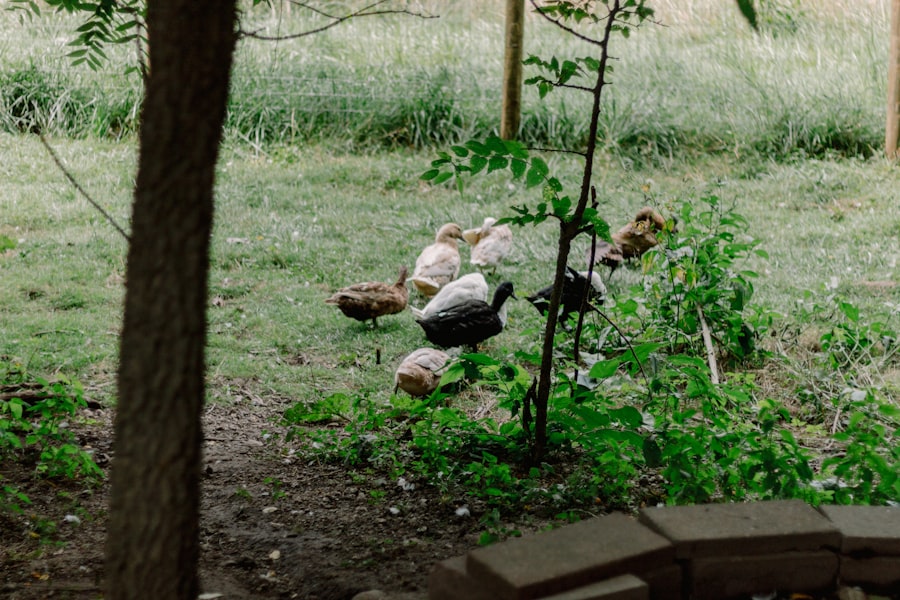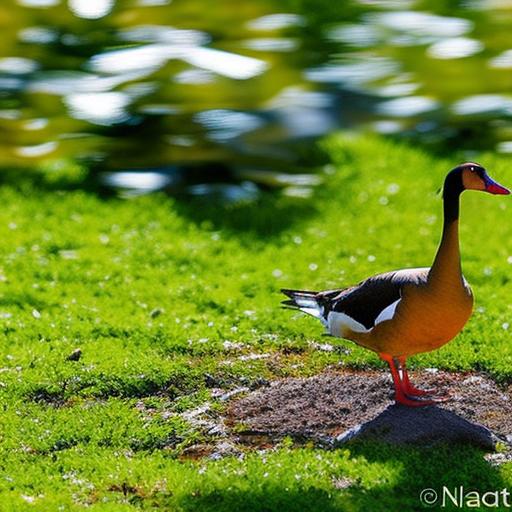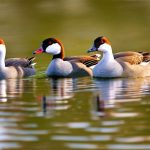Geese invading gardens and lawns can be a frustrating problem for many homeowners. These large birds can cause damage to plants, leave behind droppings, and create a mess in outdoor spaces. However, it is important to find humane solutions to this issue, as geese are protected by wildlife laws in many areas. In this article, we will explore various methods for deterring geese from gardens and lawns while ensuring their well-being.
Key Takeaways
- Geese are social animals and tend to graze in large groups.
- Geese are attracted to areas with open water, short grass, and easy access to food.
- Physical barriers such as fences, netting, and decoys can be effective in deterring geese.
- Planting tall grasses, shrubs, and trees can create a natural barrier and discourage geese from grazing.
- Loud noises, flashing lights, and moving objects can scare geese away.
Understanding the behavior of geese
To effectively deter geese, it is important to understand their habits and behavior. Geese are social animals that often travel in flocks. They are attracted to areas with open spaces, water sources, and abundant food. Geese are herbivores and graze on grasses, plants, and crops. They are also attracted to areas near bodies of water where they can rest and find food.
Identifying the areas where geese are likely to graze
Geese are likely to graze in areas that provide them with easy access to food and water. They are attracted to open spaces such as lawns, golf courses, and parks where they can find ample grass to graze on. Geese also prefer areas near bodies of water such as ponds or lakes where they can rest and find food sources like aquatic plants or insects.
To identify the areas in your garden or lawn where geese are likely to graze, look for signs of their presence such as droppings or feathers. Geese tend to leave behind large amounts of droppings in areas they frequent. Additionally, keep an eye out for areas with short grass or damaged plants, as these may indicate grazing activity.
Installing physical barriers to deter geese
One effective method for deterring geese from gardens and lawns is by installing physical barriers. There are several types of physical barriers that can be used, including fences, netting, and scare devices.
Fences can be used to create a physical barrier between geese and your garden or lawn. Choose a fence that is at least three feet tall and has small gaps between the bars to prevent geese from squeezing through. Make sure the fence is securely installed and extends below ground level to prevent geese from digging underneath.
Netting can also be used to deter geese. Install netting over areas where geese are likely to graze, such as vegetable gardens or flower beds. Make sure the netting is taut and securely fastened to prevent geese from getting entangled.
Scare devices such as scarecrows or reflective tape can also be effective in deterring geese. Place scare devices in areas where geese are likely to graze, and move them periodically to prevent geese from becoming accustomed to them.
Creating a natural deterrent with plants and landscaping
Another method for deterring geese is by creating a natural deterrent with plants and landscaping features. Geese are less likely to graze in areas that are not easily accessible or lack suitable food sources.
Planting tall grasses or shrubs around the perimeter of your garden or lawn can create a natural barrier that deters geese. Choose plants that are dense and have thick foliage to make it difficult for geese to access the area.
Additionally, incorporating landscaping features such as rocks, gravel, or mulch can make it less appealing for geese to graze. Geese prefer open spaces with short grass, so creating uneven terrain or adding obstacles can discourage them from entering your garden or lawn.
Using noise and motion to scare away geese

Geese are sensitive to noise and motion, so using these deterrents can be effective in keeping them away from your garden or lawn. There are several methods you can use to scare away geese using noise and motion.
One method is to use a motion-activated sprinkler system. These systems detect movement and spray water, startling geese and causing them to flee. Place the sprinklers in areas where geese are likely to graze, such as near ponds or open spaces.
Another method is to use noise deterrents such as wind chimes, bells, or even a radio playing loud music. Geese are wary of unfamiliar sounds and will avoid areas where they hear loud noises. Place noise deterrents strategically around your garden or lawn to create a deterrent effect.
Implementing a regular maintenance schedule to keep geese at bay
Regular maintenance is essential in deterring geese from gardens and lawns. By keeping your outdoor space well-maintained, you can make it less attractive to geese.
Tasks that should be included in a regular maintenance schedule include mowing the lawn regularly to keep the grass short, removing fallen leaves or debris that may attract geese, and trimming shrubs or plants to prevent them from becoming overgrown and providing hiding spots for geese.
Additionally, regularly inspect your garden or lawn for signs of geese activity such as droppings or feathers. If you notice any signs, take immediate action to deter geese using the methods discussed in this article.
Educating neighbors and community members about the issue
It is important to educate neighbors and community members about the problem of geese invading gardens and lawns. By raising awareness about the issue, you can encourage others to take steps to deter geese and create a more harmonious environment for everyone.
Approach neighbors and community members in a friendly and informative manner. Share information about the habits and behavior of geese, as well as the potential damage they can cause. Provide suggestions for humane methods of deterring geese and offer assistance if needed.
Encouraging natural predators to visit your garden
One natural and humane method for deterring geese is by encouraging natural predators to visit your garden or lawn. Geese are wary of predators and will avoid areas where they feel threatened.
Attracting natural predators such as hawks or owls can help deter geese. Install perches or nesting boxes in your garden or lawn to provide suitable habitat for these predators. Additionally, avoid using pesticides or other chemicals that may harm natural predators or their food sources.
Using humane methods to discourage geese
When deterring geese, it is important to use humane methods that do not cause harm to the birds. Geese are protected by wildlife laws in many areas, so it is illegal to harm or kill them without proper permits.
Humane methods include using physical barriers, creating natural deterrents with plants and landscaping, and using noise and motion deterrents. These methods are effective in deterring geese while ensuring their well-being.
Seeking professional help if all else fails
If all else fails and you are unable to deter geese from your garden or lawn, it may be necessary to seek professional help. There are professionals who specialize in wildlife management and can provide guidance and assistance in dealing with geese.
Contact your local wildlife agency or a professional pest control company for advice and assistance. They can assess the situation and provide recommendations for deterring geese in a humane and legal manner.
In conclusion, deterring geese from gardens and lawns requires a combination of methods that are effective and humane. By understanding the behavior of geese, identifying areas where they are likely to graze, installing physical barriers, creating natural deterrents with plants and landscaping, using noise and motion deterrents, implementing a regular maintenance schedule, educating neighbors and community members, encouraging natural predators, using humane methods, and seeking professional help if needed, homeowners can successfully deter geese while ensuring their well-being. It is important to find humane solutions to the problem of geese invading gardens and lawns, as these birds are protected by wildlife laws in many areas.
If you’re struggling with keeping geese out of your garden, you might find this article on A-Frame Chicken Coops helpful. These coops are designed to provide a safe and secure space for your chickens, which can help deter geese from entering your garden. Additionally, you may also want to consider the benefits of having a Garden Chicken Coop, as it allows your chickens to roam freely in a designated area while still protecting your garden from unwanted visitors. For more information on how to keep geese away from your garden, check out this article on what vegetables do quails eat.
FAQs
What are some common methods to keep geese out of your garden?
Some common methods to keep geese out of your garden include using physical barriers such as fences or netting, using decoys or scare tactics, and planting unappealing vegetation.
What types of vegetation do geese find unappealing?
Geese tend to avoid plants with strong odors or prickly textures, such as lavender, rosemary, thyme, and holly.
What are some natural predators of geese?
Some natural predators of geese include foxes, coyotes, raccoons, and birds of prey such as hawks and eagles.
Is it legal to harm or kill geese?
In most cases, it is illegal to harm or kill geese without a permit. It is important to check with your local wildlife agency for specific regulations in your area.
What should I do if geese have already invaded my garden?
If geese have already invaded your garden, it is important to remove any food sources and make the area less appealing to them. You can also try using scare tactics or physical barriers to deter them. If the problem persists, consider contacting a wildlife control professional for assistance.
Meet Walter, the feathered-friend fanatic of Florida! Nestled in the sunshine state, Walter struts through life with his feathered companions, clucking his way to happiness. With a coop that’s fancier than a five-star hotel, he’s the Don Juan of the chicken world. When he’s not teaching his hens to do the cha-cha, you’ll find him in a heated debate with his prized rooster, Sir Clucks-a-Lot. Walter’s poultry passion is no yolk; he’s the sunny-side-up guy you never knew you needed in your flock of friends!







